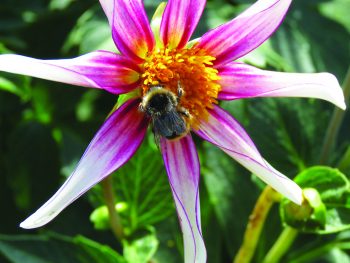Nature Notes – Biodiversity Begins At Home
Nature is being squeezed. It is virtually impossible to drive more than a few miles before coming across ‘green’ areas that are disappearing under concrete and tarmac. At the same time, the reduction in land available for farming adds pressure on farmers to use ever more intensive methods of production. Gardens occupy more land than all the nation’s nature reserves combined. To protect biodiversity, things that can be done in my/your garden, backyard or window box, might just help.

Pest Control
Once Christmas commitments have been fulfilled, gardeners traditionally use January and February to plan for the new growing year. In most domestic gardens we are thinking small scale, from microscopic fungi and bacteria that provide healthy soils, through beneficial insects that might be pollinators or pest controllers, on to garden birds which can also help us with pest control.
As a quick rule, the more organic we can make a garden the better it will be for soil health, for natural pest control and for healthy produce. In practice this might involve:
- Homemade compost and leaf mould.
- Buying peat free potting composts and rotted farmyard manure.
- Sowing ‘green manure’ in the autumn to dig into the soil at the end of winter.
- Using fibre instead of plastic pots.
- Using plant-based fertilisers e.g. from comfrey or seaweed concentrates instead of inorganic chemicals.
Insect Friendly Planting
Insects are not only beneficial as pollinators but bring colour and enjoyment to our gardens. When buying seeds, plug plants or shrubs you might want to consider how your choices could help:
- Seed packets and plant labels usually indicate if flowers are pollinator friendly. Simple, open flower heads will be more accessible than doubles and hybridised variants. Flowers in the daisy family are ideal.
- Early spring is the hardest time for insects to find pollen in nature. There are many garden plants that can help fill this gap from crocuses and hellebores to shrubs such as viburnum tinus and if you have space, any tree that produces ‘catkins’.
- Every garden should have space for herbs. Lavender, thyme, oregano, mint and chives are easy to grow, useful in the kitchen and great for pollinators.
- If you have space to add a tree to your garden try not to be seduced by fancy exotics and plant a native tree. Hawthorn and holly are two that need not take up too much space and gardens with rowan trees are enjoying the waxwing winter that I wrote about last month. Some quite small trees have been visited by flocks of up fifty of these exotic visitors.
Encourage Wildlife & Insects
Finally, controlling pests with as little use of insecticide or herbicide as possible requires us to provide conditions that benefit our avian and insect allies:
- Nest boxes need to be in place by the end of February if they are to be occupied this year and birds such as blue tits feed their young mainly on caterpillars.
- A bug/bee hotel will keep some of your pollinating insects happy and will also attract ladybirds and hoverflies which in turn will reduce the risk of aphid damage.
- A log pile in a quiet corner of your garden will provide a home for beetles and maybe a hedgehog.
- If you have space for a pond, try to avoid putting in fish. The amphibians and dragonflies that will colonise your pond over time will in turn reduce your slug and mosquito populations.
David Scott




 Kibworth Ladies Choir
Kibworth Ladies Choir

